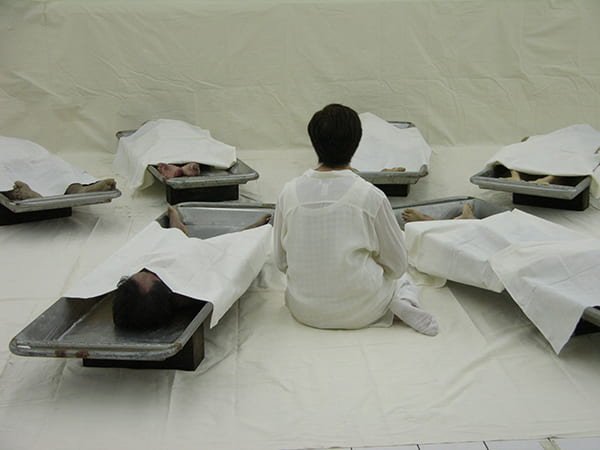
On Optimism and Death: Public Program for Exhibition @ Margaret Lawrence Gallery
This October, DeathTech Research Team member Tamara Kohn participated in a panel discussion in conjunction with the exhibition Hope Dies Last: Art at the End of Optimism.
Hope Dies Last: Art at the End of Optimism is a curated exhibition of Australian and international contemporary art presented across two sites, Gertrude Contemporary and the Margaret Lawrence Gallery at the Victorian College of the Arts. The project focuses on how artists consider the depletion of optimism, how they might envisage the end of days, and how they make sense of these tumultuous times. Exploring themes of mortality, fatalism, extinction, pain (both emotional and physical), failure and downfall, the works largely focus on the specific moment when hope evaporates for the final time. Explored with compassion, humour, sadness and resignation, Hope Dies Last confronts our individual and collective anxieties around death, reminding us of the certainty of this fate, yet recognising this conclusionary moment as one we will experience alone. Hope Dies Last will be one of the most depressing events of the year, an exhibition that will riddle us with sadness, and likely leave us more pessimistic than we have ever been before.
The panel discussion assembled a selection of esteemed speakers whose professional lives can involve considerations of death and grief. Drawing in a range of perspectives, the discussion traversed across ideas of mortality, memorialisation, the defence of life, and the pragmatics of death. Hopefully not as bleak as it sounds, On Optimism and Death offered a unique platform to consider the prospect of death and its impacts – personally and collectively – through the lenses of anthropology, the legal system, the arts and the funerary industry.
On Optimism and Death was chaired by Mark Feary, Artistic Director,
Gertrude Contemporary
Participating Speakers:
Eric Jong, exhibiting artist
In the exhibition Hope Dies Last, Eric Jong presents the work Death and Paperwork(2017), from the project Too Poor To Die focussing on destitute funerals for persons lacking the financial resources to pay for their own funerals. For this project, the artist worked closely with Bereavement Assistance, a not for profit organisation
in Melbourne.
Professor Tamara Kohn, Professor of Anthropology,
The University of Melbourne
Tamara Kohn is a Professor of Anthropology with extensive fieldwork experience in the Scottish Hebrides, the eastern hills of Nepal, and more recently Japan. She has held research and teaching positions in England (Oxford and Durham) and Australia (the University of Melbourne). Her research focuses on identity and experience, the study of trans-cultural communities of practice (from caring practices to sports and other embodied arts), mobility (migration, intermarriage, leisure/travel), death studies, methods and ethics, and the anthropology of the senses.
Audrey Lake, Funeral Consultant
Audrey Lake has spent 13 years working with death in diverse settings, beginning her career as a counsellor in palliative care. With an interest in forensics and the criminal justice process she moved onto roles with the Initial Investigations Office at the Coroners Court of Victoria and the Victims Support Unit at Victoria Police working with families through the early stages of unexpected or traumatic bereavement. Subsequently she transitioned into working as a mortician at the Victorian Institute of Forensic, a coronial undertaker and a funeral consultant for a not for profit
funeral company.
Michael O’Connell SC, Judge, County Court of Victoria
Michael O’Connell was appointed to the Victorian Bar in 1990 and as Senior Counsel in 2008. During his 30-year legal career, he has been involved in several homicide, terrorism, white collar crime, sexual offences and occupational health and safety cases. The barrister served as part of the team of Australian lawyers representing accused members of the Bali Nine, including Myuran Sukumaran.
Categories